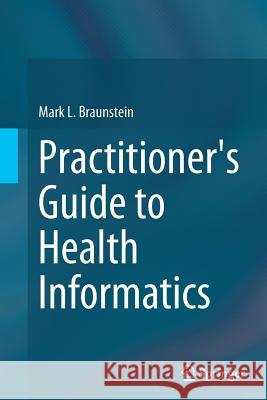Practitioner's Guide to Health Informatics » książka
Practitioner's Guide to Health Informatics
ISBN-13: 9783319366623 / Angielski / Miękka / 2016 / 162 str.
"This book will be a terrific introduction to the field of clinical IT and clinical informatics" -- Kevin Johnson"Dr. Braunstein has done a wonderful job of exploring a number of key trends in technology in the context of the transformations that are occurring in our health care system" -- Bob Greenes"This insightful book is a perfect primer for technologists entering the health tech field." -- Deb Estrin"This book should be read by everyone." -- David Kibbe This book provides care providers and other non-technical readers with a broad, practical overview of the changing US healthcare system and the contemporary health informatics systems and tools that are increasingly critical to its new financial and clinical care paradigms. US healthcare delivery is dramatically transforming and informatics is at the center of the changes. Increasingly care providers must be skilled users of informatics tools to meet federal mandates and succeed under value-based contracts that demand higher quality and increased patient satisfaction but at lower cost. Yet, most have little formal training in these systems and technologies. Providers face system selection issues with little unbiased and insightful information to guide them. Patient engagement to promote wellness, prevention and improved outcomes is a requirement of Meaningful Use Stage 2 and is increasingly supported by mobile devices, apps, sensors and other technologies. Care providers need to provide guidance and advice to their patients and know how to incorporated as they generate into their care. The one-patient-at-a-time care model is being rapidly supplemented by new team-, population- and public health-based models of care. As digital data becomes ubiquitous, medicine is changing as research based on that data reveals new methods for earlier diagnosis, improved treatment and disease management and prevention.
This book is clearly written, up-to-date and uses real world examples extensively to explain the tools and technologies and illustrate their practical role and potential impact on providers, patients, researchers, and society as a whole.











